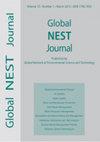CLIMATE CHANGE AND RURAL LIVELIHOODS-ADAPTATION AND VULNERABILITY IN RAJASTHAN
IF 1.2
4区 环境科学与生态学
Q4 ENVIRONMENTAL SCIENCES
引用次数: 17
Abstract
Rajasthan, with its climate ranging from arid to semi-arid to sub-humid, and rapidly depleting natural resources, is already experiencing the effects of climate change. The region’s climate is projected to become harsher, with increased average temperatures, intensity of rainfall events, and increased variability in space & time of monsoon rains being consistently projected for the region. Without action in the form of adaptation of social, human, economic, and natural resource management systems, these weather changes are predicted to result in decreasing surface and ground water availability, flash floods, degradation of soil resources, decrease in crop yields, greater vulnerability to crop pest outbreaks, and declines in forest and pastureland ecosystem goods and services, thus rendering agricultural and herding communities extremely vulnerable to weather related losses of life, livelihood, and food security. In Rajasthan, government is focussing for sustainable development and climate change adaptation by finding and administering alternative methods to deal with issues of poverty and environmental degradation in context of linkage between livelihood and the immediate environment of the people. The livelihoods of the rural poor are directly dependent on environmental resources like land, water, forests — and are vulnerable to weather and climate variability. Climate change affects every aspect of society, environment and economy requiring adjustments in behaviour, livelihoods, infrastructure, laws, policies and institutions in response to experienced based expected climatic events. However, it was found that local coping strategies and traditional knowledge need to be used in synergy with government and local interventions. Solutions must be integrated to address the interrelationships between water, agriculture, forests and pastures, livestock. Finally, there is great potential for existing policies and schemes to be employed synergistically towards building true adaptive capacity for the rural communities. However, adapting to climate change will entail adjustments and implementation at every level – from community to national and international.气候变化与拉贾斯坦邦农村生计的适应和脆弱性
拉贾斯坦邦的气候范围从干旱到半干旱再到半湿润,自然资源正在迅速枯竭,它已经在经历气候变化的影响。预计该地区的气候将变得更加恶劣,预计该地区的平均气温将升高,降雨事件的强度将增加,季风降雨的时空变异性也将增加。如果不以适应社会、人类、经济和自然资源管理系统的形式采取行动,预计这些天气变化将导致地表水和地下水供应减少、山洪暴发、土壤资源退化、作物产量下降、更容易受到作物病虫害的影响,以及森林和牧场生态系统产品和服务减少。因此,农牧民社区极易受到与天气有关的生命、生计和粮食安全损失的影响。在拉贾斯坦邦,政府将重点放在可持续发展和适应气候变化上,通过寻找和管理替代方法来处理贫困和环境退化问题,将生计与人民的直接环境联系起来。农村贫困人口的生计直接依赖于土地、水、森林等环境资源,而且容易受到天气和气候变化的影响。气候变化影响到社会、环境和经济的各个方面,需要对行为、生计、基础设施、法律、政策和机构进行调整,以应对基于经验的预期气候事件。然而,研究发现,地方应对策略和传统知识需要与政府和地方干预措施协同使用。解决方案必须综合起来处理水、农业、森林和牧场、牲畜之间的相互关系。最后,现有的政策和计划有很大的潜力可以协同利用,为农村社区建立真正的适应能力。然而,适应气候变化将需要从社区到国家和国际各个层面的调整和实施。
本文章由计算机程序翻译,如有差异,请以英文原文为准。
求助全文
约1分钟内获得全文
求助全文
来源期刊

Global Nest Journal
环境科学-环境科学
CiteScore
1.50
自引率
9.10%
发文量
100
审稿时长
>12 weeks
期刊介绍:
Global Network of Environmental Science and Technology Journal (Global NEST Journal) is a scientific source of information for professionals in a wide range of environmental disciplines. The Journal is published both in print and online.
Global NEST Journal constitutes an international effort of scientists, technologists, engineers and other interested groups involved in all scientific and technological aspects of the environment, as well, as in application techniques aiming at the development of sustainable solutions. Its main target is to support and assist the dissemination of information regarding the most contemporary methods for improving quality of life through the development and application of technologies and policies friendly to the environment
 求助内容:
求助内容: 应助结果提醒方式:
应助结果提醒方式:


